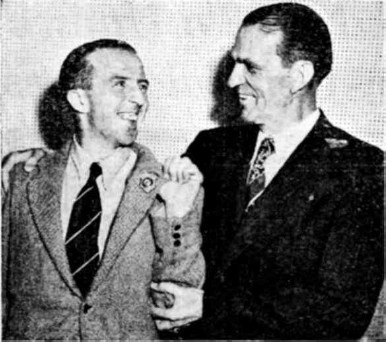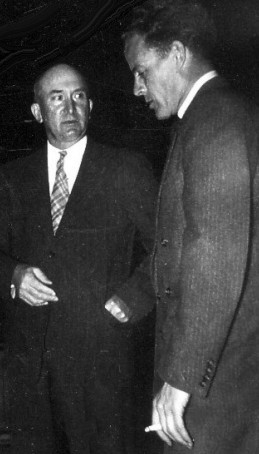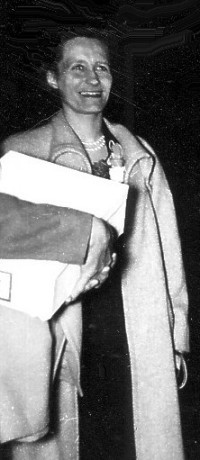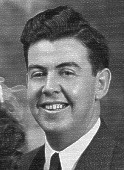Todd was also planning a trip. In early May, he would accompany Deputy Mayor Jean Falaize and his daughter of Orléans,
France to Wichita, Kansas. Wichita was adopting the French community.
There is ample reason to suggest that Morganville's experience had influenced Wichita's decision. Certainly Morganville
had received considerable publicity about its experience and Peter Wyden, then a reporter for the Wichita Eagle, had
visited the little village 150 miles to the north on the Republican River.
These city-to-city programs were garnering a lot of national attention. The April 22, 1949 press release from Todd's
office about the Wichita-Orléans pairing generated the following piece in the New Castle, Pennsylvania newspaper that
same day.
NEW YORK - Operation Democracy, clearing house for town-affiliation programs, announced today that
Wichita. Kan., and Orleans, France, will exchange mayors for a week beginning May 7. The announcement said Mayor
William T. Salome of Wichita and Deputy Mayor Jean Falaize of Orleans will leave their homes by air
May 5, arriving in their "sister cities" in time for simultaneous ceremonies May 7. The exchange was termed the most
ambitious program of its kind ever undertaken. Wichita will celebrate Orleans' traditional "Joan of Arc" Festival on
May 7 and 8 with Mr. Falaize' 17-year-old daughter, Marie-Dominique, honored as "Maid of Orleans." The program will
include a reunion of the 137th infantry regiment that liberated Orleans in World War II.
Mayors Falaize (left) and Salome
The paths of the two mayors crossed in New York City where they were interviewed on "Voice of America." That broadcast was beamed to France. Then Falaize, Marie Dominique, Todd, and Todd's wife Clare traveled by train to Wichita. After the festivities, Falaize and his daughter went with a UNESCO group to Denver, and then to New Orleans to deliver a personal "thank you" to the town, which had sent relief to Orléans immediately after the war.
After leaving Wichita, the largest city in Kansas to adopt a foreign city, Todd began a tour of other Kansas towns
that had either already partnered with another in Europe or were considering such an arrangement. Stops included
Salina, Abilene, Medicine Lodge, Kinsley, Garden City, Neosho, McPherson, Russell, El Dorado and Hutchinson.
It also included the smallest adopter - Morganville - where a reception awaited. The program that Thursday, May 12 evening,
was held at the Stadium. It began with the singing of the national anthems, just as with the play. But unlike that August
evening, "La Marseillaise" was sung in English by Ralph Lamar.
Emette Davis' health had declined and so he had left the village for Kansas City where his son was a doctor. Dan
Roenigk was now both the Morganville-Fèves committee treasurer and village mayor. Roenigk spoke briefly and then
turned the program over to Carson, who introduced the others.
Todd praised Morganville for, as the Tribune reported, "helping change the whole feeling of Europe toward American
democracy," and added that adoption programs offer "a solution for peace that governments, armies, politics, and
diplomats have been unable to achieve."
Dan Roenigk, left, and Charles Todd
A special guest that evening was Ségolène de Wendel. She had flown into Kansas City and then traveled to Morganville
to represent the people of Fèves. It was her family who had developed the iron industry in Lorraine centuries earlier. She had
long been an advocate for the people of Lorraine and also represented the Croix-Rouge Française - the French Red Cross.
Her efforts during the war had resulted in her arrest, incarceration and torture.
About her visit, the Tribune observed:
Miss de Wendel has the usual French charm and spoke feelingly of the trials of a subjugated country. She explained that if the inhabitants of Feves have been slow about accepting our correspondence, it is because they are still numb from the troubles they have been through. Most of their children are undersized from malnutrition. Practically every home was bereaved during the war and all suffered property loss. Many, including Miss de Wendel herself, spent grueling periods in concentration camps, expecting hourly to be shot. Many were. Miss de Wendel's family entertained General Patton during the combat. She spoke of him with gratitude.
She was much interested after the speaking to talk with Lyle Bloom, who had sung the Star Spangled Banner so excellently, because Lyle had been in Feves and other parts of the Metz district during the war. Lyle was glad to be able to apologize for some of the damage done by our own soldiers in the ways of war. Lyle claims we can hardly repay them for the milk and chickens which our own hungry boys helped themselves to.
Ségolène de Wendel in Morganville
Delbert "Lyle" Bloom
On May 10, while Morganville was still reflecting on the recent visit by the Todds and de Wendel, Torlotting wrote another letter to Roenigk providing an update on conditions in Fèves.
Dear friend,
First of all, I thank you for the address [of the Utleys] in Paris. I shall do what is necessary.
Thanks from our hearts. Thanks for my students. Thanks for the inhabitants of Fèves, who all, without exception, are my
friends and for whom, since the liberation, I have without slacking taken pains to better their conditions and hasten
reconstruction. In France, like everywhere else, only those who have stamina and endurance can come to the results. I
myself have made all the documents of the damage. (More than 60 books.) This has necessitated expenses. You easily realize
that there are always some people who wish to profit under such circumstances. I shall not relate these details, to gain
good standing. I only do my duty as an honest man who hopes to find reward later. I only wish to make you understand why
I do not answer immediately your letter. Please excuse.
The number of things you have sent us is exactly what we have received. The packages of seed have arrived. The five
packages are distributed and sown. Wednesday, the food arrived and Friday, my wife and myself have arranged the
distribution between 2:30 and 6:30 and at 7 o'clock, in the presence of the mayor, the pastor and police. Each person has
received 300 grams of sugar, 300 grams preserves. We gave each family a box of pastry [sic - pasta], a box of cocoa, and a
good piece of cheese. Each child received an extra box of cocoa. I do not know if you have figured the value, but it means 800 to
1000 francs [for] each family. Imagine how happy our people are. The clothing is distributed. ... The pastor has distributed
the layettes, but the mayor reserved some for later births. We wrote down everything one received so we know exactly what
each one got.
And here a note of gladness. Just think the package for the school has arrived (pencils, pens, etc.). Saturday afternoon
was a day of joy. Pencils with erasers. Pencils with colors. The mayor was so touched at the sight of the children's joy,
that he could not speak a word.
... I have to mention this interchange: Mr. Todd from American Aid has proposed for me to make a trip to Morganville.
Grand, dear Mr. Todd. What a magnificent remembrance he leaves in Fèves. Gracious and understanding, big hearted. He knew
how to capture the heart of all who approached him. Although, dear friend, the Lorraine people are understood to be calm
and reluctant, this plan for a trip is fine. But he ignores the fact that a French teacher cannot permit himself such a
voyage. He has not the means.
I am asked to solicit sugar for the preparation of preserves. Sugar is scarce. Rice, if you have that. Grown ups have not
seen rice since 1940. For babies, we need cereal. You know that Fèves has 300 inhabitants, so you know how much you may
send. We must go to Luxembourg for coffee where it can be gotten. I ask, of course, for food. Your sending of clothing has
helped for the immediate needs. We expect payments for war losses which will permit our people to buy linens for their
homes.
Dear friend, I am sending you our dear expression of friendship. Kindly greetings to all our friends in Morganville. ...
The broadcast "Homage to Fèves" was received over radio station Nancy. It was magnificent. All Fèves listened.





